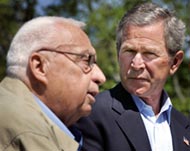Saudi leader to meet Bush in Texas
Saudi Crown Prince Abd Allah bin Abd al-Aziz will visit US President George Bush at his Texas ranch on Monday for talks expected to focus on the Middle East peace process and soaring oil prices.

On Sunday, the crown prince and de facto leader of Saudi Arabia, met in Dallas, Texas, US Vice-President Dick Cheney, according to US officials, who declined to provide further details on the discussion.
Bush and his guest, meeting for the second time on Bush’s ranch, will discuss the US-led war on terrorism at a time when Riyadh has been cracking down on suspected al-Qaida extremists, US officials said.
Promoting reforms
According to White House spokesman Scott McClellan, Bush will discuss “efforts to promote democratic reform” in the Middle East with Abd Allah.
Saudi Arabia recently held a nationwide vote to choose half the members of 178 municipal councils across the conservative Muslim kingdom. Women were barred from the ballot.
|
“We’ve got to get a straight answer from the [Saudi’s] as to what they think their excess capacity is” |
The US president has been highlighting what many commentators are calling an ”Arab spring” in the region – with elections having taken place in US-occupied Afghanistan and Iraq, as well as changes in Lebanon and Egypt.
But the White House has not responded to Human Rights Watch’s request for Bush to ask the crown prince to free three imprisoned Saudi dissidents facing charges of “using Western terminology” in seeking reforms.
Saudi initiative
On the Middle East, the crown prince was expected to raise his initiative for ending the Israeli-Palestinian conflict, which the Arab League adopted at its summit in 2002 but which Israel has rejected.
The blueprint, raised anew at last month’s Arab summit in Algiers, calls for the creation of a Palestinian state and offers Israel peaceful relations with Arab countries if it withdraws from Arab land it has held since the 1967 war.
To date, Washington has shown little interest in the plan, focusing most of its energies on seeking global support for Israel’s controversial decision to withdraw from Gaza while keeping some West Bank settlements.
Another sensitive topic will be the soaring gas prices in the United States, which experts blame in part for the sharp drop in Bush’s approval ratings to his lowest level in some polls since taking office in January 2001.
Oil pressures
Bush has said he does not have a “magic wand” to lower prices at the pump, but he has seemed to question Saudi statements that the kingdom is producing as much as the market is demanding.
Bush told CNBC television this week: “I don’t think they’re pumping flat out.
 |
|
Bush will also raise the issue of the |
“I think they’re near capacity, and so we’ve just got, got to get a straight answer from the government as to what they think their excess capacity is,” he said.
Saudi Oil Minister Ali al-Nuaimi said on Thursday in Paris the kingdom was meeting oil demands, declaring: “We try to respond to our customers. We have not turned down a customer who says, ‘I want additional oil.'”
Democrats’ criticism
Some opposition Democrats have seized on the president’s pledge, in the 2000 White House race, to address the issue with members of the Opec oil cartel.
“Five years later, and Americans suffering under record-high gas prices are still waiting to see the president keep his promise to jawbone Opec,” said Senator John Kerry, Bush’s rival in the 2004 presidential race.
“There’s no denying that getting the Saudis to open the spigot could make a difference tomorrow,” Kerry’s spokesman David Wade added. &nb